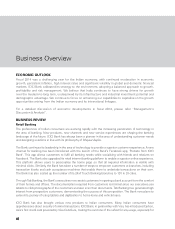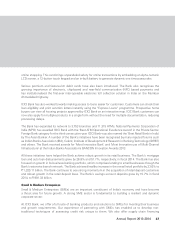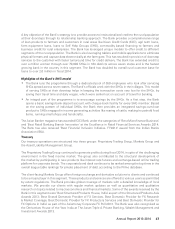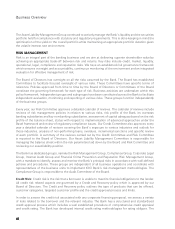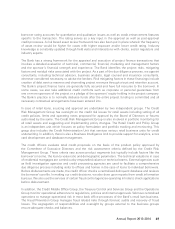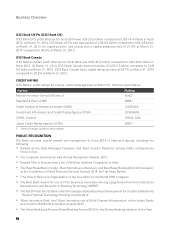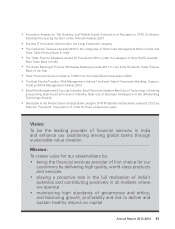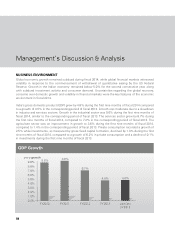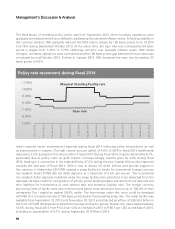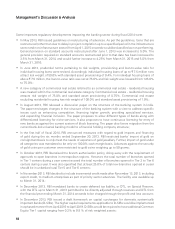ICICI Bank 2014 Annual Report Download - page 54
Download and view the complete annual report
Please find page 54 of the 2014 ICICI Bank annual report below. You can navigate through the pages in the report by either clicking on the pages listed below, or by using the keyword search tool below to find specific information within the annual report.52
Business Overview
52
Business Overview
The Bank is of the view that good service is integral to the quality of business generated and when
employees experience service orientation themselves, they would exemplify the same towards customers.
This led to the launch of Saath Aapka as the Bank’s promise to its employees, similar to the Khayaal Aapka
promise to customers. Saath Aapka emphasises five anchors:
• Growth&Learning
• Meritocracy
• Care
• EnablingEnvironment
• WinningOrganisation
In this context, the HR strategy is focused on:
A culture of meritocracy & high performance balanced with sensitivity:
The Bank is a caring meritocracy. While the leaders in the Bank are demanding when it comes to
performance, they are also sensitive and caring towards their team members and colleagues. Treating
others with respect, dignity and empathy are important aspects of the Bank’s culture. The leaders in the
Bank support their team members during difficult times and invest their personal time to develop team
members’ capabilities. Care and sensitivity are important behaviours that the Bank evaluates during the
annual leadership potential assessment exercise. All HR policies and practices are underpinned by the
Bank’s philosophy of being a caring meritocracy. The Bank has liberal leave policies which are aligned to
cater to the life stage needs of the employees. The Bank provides specific leave for adoption, childcare,
fertility treatment and maternity in addition to privilege leave, casual leave and flexible sick leave. The
Bank has established a 24X7 emergency helpline to support employees and their family members. The
Bank has launched Quick Response Teams (QRT) to assist women employees if they are in distress while
commuting. Each QRT has a GPS-enabledvehicle, with a stretcher and other equipment, and a team
trained to deal with medical and personal safety related emergencies. The Bank believes that the care it
shows towards employees, will motivate them to exhibit the philosophy of Khayaal Aapka while dealing
with customers.
Investing in pre-employment training and support structures for new recruits:
It has been seen that the higher education system in India does not adequately prepare students with
the requirements of the workplace and hence young employees often struggle in the inital years of
their professional life. As a result, they suffer from low productivity leading to erosion in self-confidence
which adversely impacts their performance. To address this challenge, the Bank decided to move to a
model of investing in young people and making them job-ready, even before they join the Bank. Further,
the Bank broke the stereotype definition of talent, by identifying nascent talent in the hinterland of the
country, beyond the metropolitan cities. This strategy, since its implementation in 2006, has enabled the
Bank to build robust capacity for creating a steady pool of pre-trained, job-ready talent not only for itself
but also for the banking & financial services sector. The Bank launched a number of industry-academia
programmes such as the Institute for Banking, Finance & Insurance (IFBI) for entry-level jobs in customer
service and operations; ICICI Bank Sales Academy for front line sales roles; ICICI Manipal Academy (IMA)
for entry level managerial roles and ICICI Business Leadership Programmes for roles in risk management,
wholesale banking, treasury and IT. All these programmes have significant focus on skill building through
practice sessions in classrooms as well as structured internship in the Bank’s branches and offices.
They provide inputs on the Bank’s products, norms, IT systems, service philosophy and the regulatory
guidelines, equipping the new employees with required knowledge and skills even before they join the


